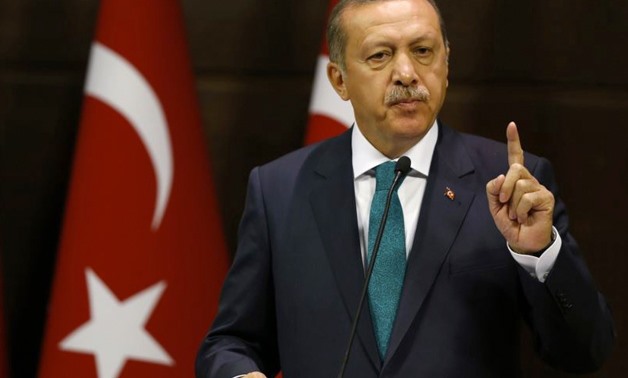
Turkish President Recep Tayyip Erdoğan - via Reuters
CAIRO – 21 August 2017: It became obviously clear that Turkish President Recep Tayyip Erdoğan is taking advantage of the failed coup, which took place on July 15, 2016, in an attempt to gain absolute power in Turkey. Yet Erdoğan’s authoritarian regime has unfortunately resulted in chaos and bloodshed.
The government has blamed the coup attempt on loyalists of Fethullah Gulen, a Turkish cleric who lives in exile in Pennsylvania. Therefore, it is detaining any person suspected to have links with Gulen.
Who ended behind bars?
Over 50,000 people have been arrested while more than 100,000 people have been dismissed from the public sector under the state of emergency imposed after the coup bid.
Although activists and Western governments have criticized the crackdown, the government insists it is necessary to eliminate all unknown coup plotters, it still remains unclear who exactly was behind the coup that killed and injured dozens.
The purges widen to include police, education and media.
Turkey arrested 35 media workers:
Turkish authorities had issued arrest warrants for 35 employees and at least 89 journalists. The crackdown has also affected foreign reporters and freelance journalists. 131 media organizations were closed upon Erdoğan’s order.
Turkey fires 1,519 Imams:
Turkey dismissed about 1,519 Imams and staffers from the Directorate of Religious Affairs over alleged links to terrorism on Sunday.
Turkey detains 42 teaching faculty:
Turkey detained 42 staff of two Istanbul universities including a prominent academic as part of the investigation.
State of Emergency’s impact on political domain
The consequences of the failed coup increased Ankara's diplomatic international isolation; the subsequent purge went far beyond anything that could be expected.
The continuous violations increasing in Turkey are weakening the country’s chances to obtain European Union membership, which has been a dream of Turkey for 40 years.
The crisis between Saudi Arabia and its allies and Qatar only adds to the host of problems Turkey is facing on the diplomatic front.
How it affected Turkey’s economy
The political situation of Turkey affected the country’s economic affairs, as citizens and foreign investors fear investing in Turkey.
Turkey is facing fewer investments and a reduction in tourism which is considered a high deterioration of the country’s economic growth.
Prior to the coup attempt, the economic growth rate was around five percent, which was considered an achievement for Turkey at the time. Despite that, the flow of foreign capital, which is a vital resource for the Turkish economy, was slow.
The June coup: during and after
Earlier, on July 15, 2016, an army faction had launched a failed coup against Erdoğan which left 249 people dead, not including the plotters. Erdoğan blames the botched coup on Gulen, a former ally turned arch-foe.
Erdoğan was on vacation in Marmaris in western Turkey at the time and urged the population to resist, which many did while he rushed back to Istanbul.
Many arrests had taken place after Erdoğan proclaimed a state of emergency.
In August, Erdoğan met with Russian President Vladimir Putin to cement relations with him after years of suspending confused relations.
Erdoğan then accused Germany and Netherlands of acting like “Nazis;” relations with Germany have continued to deteriorate since.
A referendum on constitutional changes was held to expand Erdoğan's powers. The referendum result enabled him to stay in office until 2029.
The new presidential system will come into force after presidential and parliamentary elections in November 2019.
International observers from the OSCE and the Council of Europe say the poll did not meet European Union standards and call on Turkey to investigate presumed irregularities.

Comments
Leave a Comment